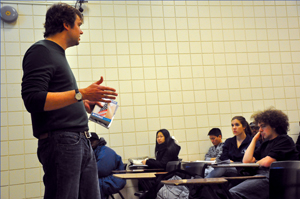
Each semester Binghamton University students register for courses, hoping to find at least one class among the dredges of requirements that excites and inspires. This spring, at least 45 BU students have found that excitement in SOC 380E: Obama in Socio-Historic Perspective: Legacies of the Civil Rights Struggle.
Jeff Howison, a graduate student in the sociology department and the course’s instructor, said that while the course is not a “biography on Obama,” it will touch on how Obama’s election has shown unprecedented gains in the Civil Rights Movement and demonstrated how political parties have evolved throughout history.
“I certainly hope to tie in major contemporary events to the larger themes of the course,” Howison said. “This course tries to situate Obama in a larger historical and political process.”
Howison said he envisioned the course covering four major themes: U.S. regionalism, the Civil Rights Movement, the white South, and the 1970s and beyond. Obama will be discussed in each of the four topics.
“I’m really excited about the course and I expect to gain knowledge about both political parties,” Dilmarys Pena, a senior biology major taking the class, said. “It’s hard to be a student and be politically informed, especially when you’re a science major.”
Howison told his students that, due to the novelty of the course and the unpredictable future of the next few months, the class syllabus would not be set in stone. During class, he said he would be open to any suggestions by students throughout the semester.
Students enrolled in the course said they were hoping to gain insight into political parties, the Civil Rights Movement and, of course, President Obama.
“I think it’s really applicable to the times right now considering Obama just got elected,” Brad Pacalis, a senior sociology major, said. “It’s important in understanding the Civil Rights Movement.”
However, according to Howison, the course is important not only because of Obama’s election, but also because of the current state of the economy and the restructuring of institutions the United States previously relied on.
“I feel like right now is a great time to be in the social sciences because people are starting to turn to them to give meaning to the world and to answer their questions,” Howison said.
The excitement and popularity of the class has given Howison a renewed enthusiasm for the course as well, he said.
“Excitement is kind of contagious,” Howison said.
Howison also said he thought it was a privilege to be able to teach such a course while surrounded by such a positive learning environment.
Though the class was originally capped at 39, Howison allowed at least 10 additional students into the class, and still more continue to bring in petitions. Howison said he believed that “the course would fill up regardless of the cap.”
Howison said he hoped the course will continue to evolve at BU, whether he continued teach it or someone else within the department took over. He added that he believes it offers tools to help people understand contemporary U.S. politics, among other things.


